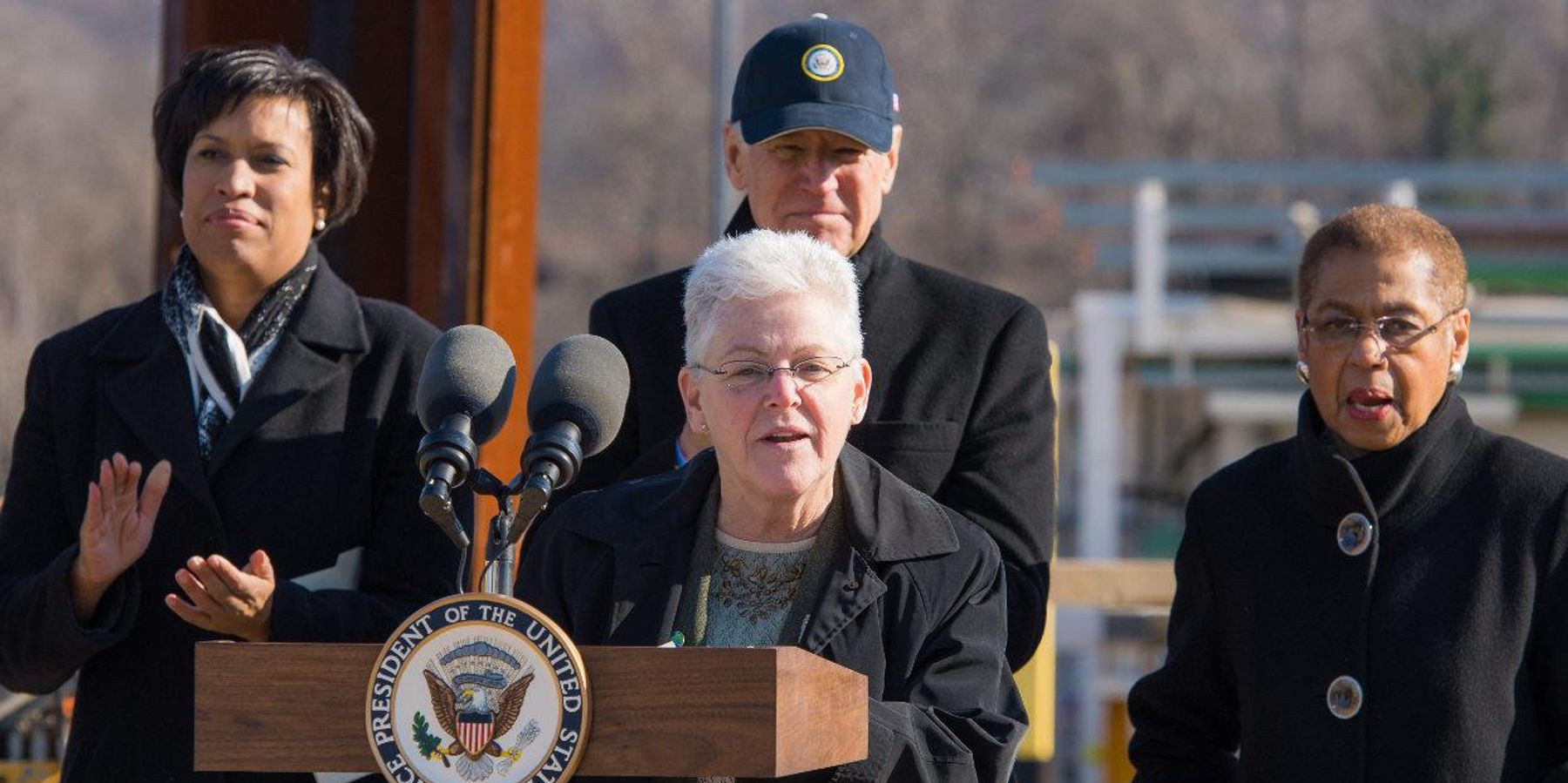
Op-ed: Gina McCarthy takes the reins on national climate action
Some suggestions for President Biden's climate czar.
Gina McCarthy, President Biden's Director of the Office of Domestic Climate Policy, has her work cut out for her.
Her job is to implement the president's new climate Executive Order and put the United States on a path to net zero greenhouse gas emissions by 2050. "I'm the dude who's supposed to deliver this in a timely way" she noted recently.
We can't imagine anyone who is tougher or better-equipped to do this job than Director McCarthy. But consider what is on her plate. The country needs dramatic and timely reductions in greenhouse gas emissions from major sectors of the economy -- including power, transportation, industry, agriculture, and buildings. To bring this about, she has a small White House staff and a Task Force of federal agencies. Here are some suggestions for managing early challenges:
Bring the public along
It is a long road to 2050 and sustained public support is essential to success. Demonstrating that needed actions are widely shared across economic sectors and different levels of government can help build public confidence and support for the entire enterprise. A good way to model the principle of widely shared commitments is by insisting that all federal departments and agencies integrate greenhouse gas reduction goals into their core missions. Even if the leadership of the Department of Defense, for example, understands that climate change is a security threat, its purpose is to be ready to wage war if necessary, a very energy intensive project. There are ways to move toward energy efficiency that prove to be mission-consistent, like Marines powering technology in the field with solar blankets rather than liquid fuel. Director McCarthy needs to convince federal agencies to pull their weight and then ask other governments and economic sectors to do the same.
Don’t rely on Congress
It's a big gamble to wait for Congress to enact broad new legislation, and waiting could delay deployment of smaller but effective policies. A better strategy is to strengthen existing programs and increase funding while seeking authorization of targeted new authorities where necessary.
Start now to define agency climate budgets
Congress can do a lot with money, whether for existing or modified programs; grants to state, tribal and local governments; or investments in research. There may be opportunities to work with Congress to find funds for some climate actions this summer in the FY 2022 budget. In addition, a key challenge for Director McCarthy is to be sure agencies include a comprehensive set of new climate investments in their budget proposals to the Office of Management and Budget (OMB) this September, and to be sure OMB looks favorably on such requests. This process ends up as the president's fiscal year 2023 Budget submission to Congress in February 2022. While Congress will have its own ideas, the budget proposal sets the tone.
Focus, focus
The Executive Order calls for both reaching net zero greenhouse gas emissions by 2050 and building resilience to the impacts of a changing climate. The latter is certainly important: climate change is bringing more severe storms, wildfires, heat waves, and rising sea levels. State and local governments play a key role in preparing for these risks, but they need leadership and resources only the federal government can provide. Taking on both these challenges right away would test the most talented administrators and risk a loss of focus that could cripple work to meet greenhouse gas reduction goals. One approach might be for Director McCarthy to hand off the work of building resilience to another senior leader. She could then empower that person to lead an effort to help state and local governments prepare for climate risks that is comparable to and parallel with the work to reduce greenhouse gases.
Don’t overplan
Charting a course to net zero greenhouse gas emissions will require careful planning, but there is a risk of getting bogged down with too much planning at a time when prompt action is critical. Fortunately, the president's Executive Order is not overly prescriptive, which gives Director McCarthy discretion to find the right balance between planning and action. For example, McCarthy could develop greenhouse gas reduction plans for major economic sectors on schedules that reflect readiness to proceed with implementation. The one plan specifically required in the Order is the "Nationally Determined Contribution" for the United States to global greenhouse gas reductions under the Paris Climate Agreement. That document, due this spring, can provide broad goals and a framework for more detailed plans.
Find the right fit for states
In the absence of federal leadership over the past four years, many states and cities have stepped into the vacuum. And they might have to again if politics take a different turn. But asking each state to develop its own comprehensive greenhouse gas reduction plan would be a mistake. The federal government has extraordinary powers that need to be fully exercised to have the best chance of meeting national climate goals. Yet some strategies, such as building codes and retrofits, are more appropriate for state and local governments than for the federal government. Director McCarthy should define which goals are the best fit for state and local governments and then deliver the funds needed to achieve them.
Report progress
Too often, enthusiasm for a new plan shades the reality that plans are simply an educated guess about what is needed, especially when addressing novel challenges. With experience, plans should be revised accordingly. The best way to stay ahead of these problems is to make a gold-plated, up-front commitment to regular and public reporting of progress, preferably by an objective third party, and to make course corrections as appropriate.
Setting the country on a course to achieve net zero greenhouse gas emissions by 2050 is arguably one of the more complicated tasks that this country has ever undertaken. Decisions made in the first, early days of this effort will have major ramifications for future success. There is no one we would rather have making these hard calls than Director McCarthy.
She is "the dude" and we wish her well.
Ruth Greenspan Bell is a Public Policy Scholar at Woodrow Wilson International Center for Scholars and a founder of The Environmental Protection Network.
Jeff Peterson is a retired senior policy advisor at the Environmental Protection Agency and the author of "A New Coast: Strategies for Responding to Devastating Storms and Rising Seas."
Their views do not necessarily represent those of Environmental Health News, The Daily Climate or publisher, Environmental Health Sciences.
Banner photo: Gina McCarthy (EPA Administrator at the time), President Joe Biden (Vice President at the time), and D.C. Mayor Muriel Bowser visiting a DC Clean Rivers Project. (Credit: National Archives)













